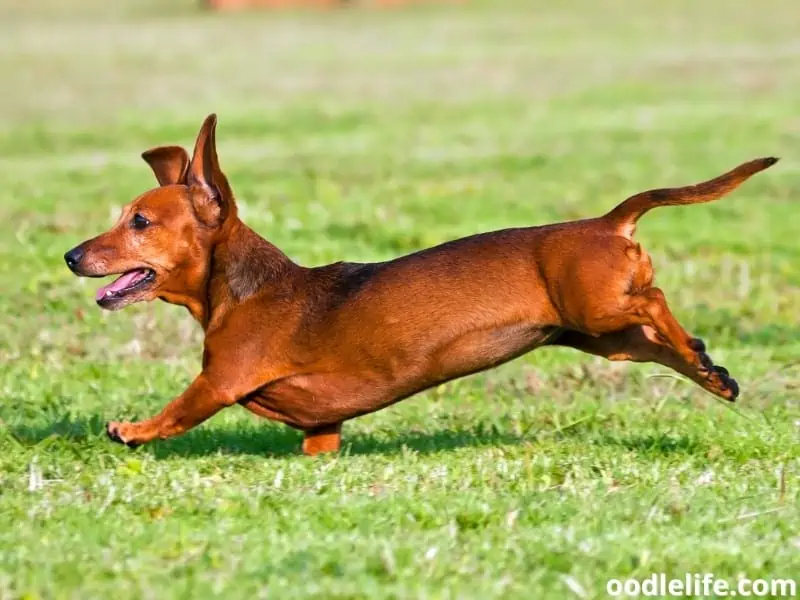How Long Do Dachshunds Live? (Dachshund Lifespan)
Ahhh….the sausage dog! Beloved by all, their distinctive long bodies and short legs make them hugely popular all around the world.
Contrary to their adorably goofy appearance and waddling walk, Dachshunds are a type of hound that was originally bred in Germany to hunt badgers. The breed’s name comes from the German word “dachs,” meaning badger, and “hund,” meaning dog.

Dachshunds come in three coat varieties: smooth, wire-haired, and long-haired. Those endearing short legs were also bred that way for a reason; Dachshunds have to fit into tight spaces like dens and burrows when hunting!
If you are lucky enough to be owned by a Dachshund, you might wonder how long your beloved sausage dog will live. In this blog post, we’ll examine a Dachshund’s lifespan, the factors that affect it, and what we can do about it.
What Is The Lifespan of a Dachshund?
Unfortunately, there is no one-size-fits-all answer to this question. The lifespan of a Dachshund depends on a number of factors, including diet, exercise, and genetics.
The good news is that in general, Dachshunds have a relatively long lifespan compared to larger breeds and tend to live between 12 and 16 years. So if you’re thinking about adopting a Dachshund, be prepared for some serious commitment!

Common Health Problems of Dachshunds
Dachshunds are generally happy, healthy dogs that can live relatively long lives. However, like any breed, they are predisposed to certain conditions whose risks must be managed.
1. Intervertebral Disc Disease
Dachshunds are notorious for their long backs and short legs, but these unique proportions can cause some serious health problems. One of the most common issues is intervertebral disc disease, which occurs when the discs that cushion the vertebrae begin to deteriorate. This can lead to pain, paralysis, and even death.
The good news is that there are steps that owners can take to help prevent this condition. For example, maintaining a healthy weight is important, as obesity can put extra strain on the spine.
Getting regular exercise is also crucial, as it helps to keep the discs healthy and strong.
Finally, it’s important to avoid jumping or other high-impact activities, as these can damage the fragile discs.

2. Obesity
Dachshunds are also prone to obesity, and this can cause a number of health problems. For one thing, obesity puts extra strain on the Dachshund’s back, which can lead to injuries.
In addition, obese Dachshunds are more likely to suffer from diabetes, heart disease, and respiratory problems. The good news is that there are a number of ways to help your pooch lose weight.
For example, you can feed them smaller meals more often, make sure they get plenty of exercise and avoid giving them table scraps.

3. Cushing’s Syndrome
Cushing’s syndrome is caused by an excess of the hormone cortisol in the body, and it can lead to a variety of symptoms, including increased thirst and urination, hair loss, and weight gain.
Fortunately, Cushing’s syndrome can be effectively managed with medication, and many Dachshunds live long and healthy lives despite the condition.

4. Eye Problems
Because of their unique anatomy, Dachshunds are susceptible to a condition called “prolapse.” This occurs when the eyeball pops out of its socket and is at risk of being damaged or injured. In severe cases, surgery may be necessary to repair the damage.
Dachshunds are also prone to another eye condition called “entropion,” which is when the eyelid rolls inward, causing the eyelashes to rub against the eye. This can be very painful and can lead to corneal damage. If you think your Dachshund may be experiencing any eye problems, it’s important to take them to the vet right away.

5. Diabetes Mellitus
Dachshunds are especially susceptible to diabetes mellitus, otherwise known as “sugar diabetes.” The disease is characterized by high levels of sugar in the blood, and it can lead to serious health problems if left untreated.
Fortunately, there are some simple steps that owners can take to help prevent their Dachshunds from developing diabetes. For example, feeding them a healthy diet and making sure they get plenty of exercise.
Unfortunately, once a Dachshund has diabetes, it will need to be carefully monitored for the rest of its life. But with the right treatment plan, most Dachshunds can live long and happy lives.

6. Addison’s Disease
Addison’s disease is a condition that occurs when the body doesn’t produce enough of the hormone cortisol. Cortisol is essential for regulating blood sugar levels, blood pressure, and the immune system.
Without enough cortisol, dogs can become very ill, and in some cases, they can even die. Symptoms of Addison’s disease include lethargy, weakness, vomiting, diarrhea, and collapse. If you think your dog may have Addison’s disease, it’s important to take them to the vet as soon as possible for treatment.
If the condition is left untreated, it can be fatal.

7. Hypothyroidism
Hypothyroidism occurs when the thyroid gland doesn’t produce enough hormones. This can lead to a variety of problems, including weight gain, hair loss, and lethargy. If left untreated, hypothyroidism can be fatal.
The good news is that hypothyroidism is relatively easy to treat, and most Dachshunds live long, happy lives with the condition.

8. Epilepsy
Epilepsy is a neurological disorder that can cause seizures. Dachshunds may start having seizures as early as six months old, and the condition can be lifelong. While there is no cure for epilepsy, medications can help to control the seizures.
If your Dachshund has epilepsy, don’t despair! With proper treatment, your furry friend can live a long and happy life.

Factors That Affect A Dachshund’s Lifespan
So why do some dogs live longer than others? Doesn’t seem quite fair! Many factors that affect a dog’s lifespan are biological and genetic, and some are simply a result of their lifestyle.
1. Diet
Everyone knows that a healthy diet is important for a long and happy life. But did you know that the same is true for your furry friend?
Just like humans, what a dog eats can have a big impact on its lifespan. A diet of high-quality, nutritionally balanced food will help to keep your dog healthy and active well into its golden years.
Conversely, a diet of table scraps and low-quality pet food will put them at risk for obesity, arthritis, and other health problems.

2. Exercise
Dogs that are overweight or obese are also at risk for a shortened lifespan, as they are more likely to suffer from health problems such as diabetes, joint problems, and heart disease.
Dachshunds and most other dogs, who get at least 30 minutes of exercise each day tend to live an average of two years longer than their sedentary counterparts.
So if you’re thinking about getting a Dachshund, be prepared to take them for plenty of walks! And if you already have a Dachshund, make sure to give them the exercise they need to stay healthy and happy. After all, a few extra years with your furry friend is priceless.

3. Breed and Genetics
Although it doesn’t quite seem fair, genetics can also play a role in a dog’s lifespan. Smaller breeds of dogs tend to live longer than their larger counterparts. This is likely due to the fact that smaller dogs have slower metabolisms and age at a slower rate.
For example, the Boxer, Bullmastiff and Rottweiler has a lifespan of 8 to 10 years, while that of a Yorkie is 14 to 16, and a Chihuahua, the smallest breed of dog, is 14 to 18!
Genetics can also affect a dog’s life expectancy in other ways. For example, certain breeds are more prone to certain health conditions, such as hip dysplasia or heart disease. However, with proper care and treatment, even dogs with health conditions can enjoy a long and happy life.

4. Environment
A Dachshund’s lifespan can be affected by many factors, including its environment. For example, a dog that spends its life in a kennel or on a chain is likely to have a shorter lifespan than a dog that lives in a loving home with plenty of space to run and play.
A dog’s environment can also affect its health and wellbeing. A dog that lives in a cramped apartment with no access to the outdoors is more likely to suffer from boredom and stress, which can lead to health problems.
Conversely, a dog that has plenty of space to run and play in an enriched environment is more likely to be physically and mentally healthy.

5. Spaying and Neutering
One of the most important things you can do for your dog is to have them spayed or neutered. This simple procedure not only helps to reduce the number of homeless animals, but it can also increase your dog’s lifespan.
Studies have shown that spayed and neutered dogs live an average of two years longer than those who are not spayed or neutered.

Final Thoughts
Dachshunds are a breed of dog that is known for its long body and short legs. They are also known for being friendly and good with children.
Fret not! Dachshunds can live anywhere from 12 to 16 years, making them a great pet choice for those who want a long-term friend.